Radosław Sikorski facts for kids
Quick facts for kids
Radosław Sikorski
|
|
|---|---|

Sikorski in 2024
|
|
| Minister of Foreign Affairs | |
| Assumed office 13 December 2023 |
|
| Prime Minister | Donald Tusk |
| Preceded by | Szymon Szynkowski vel Sęk |
| In office 16 November 2007 – 22 September 2014 |
|
| Prime Minister | Donald Tusk |
| Preceded by | Anna Fotyga |
| Succeeded by | Grzegorz Schetyna |
| Member of the European Parliament for Poland |
|
| In office 2 July 2019 – 12 December 2023 |
|
| Marshal of the Sejm | |
| In office 24 September 2014 – 23 June 2015 |
|
| Preceded by | Ewa Kopacz |
| Succeeded by | Małgorzata Kidawa-Błońska |
| Minister of National Defence | |
| In office 31 October 2005 – 7 February 2007 |
|
| Prime Minister | Kazimierz Marcinkiewicz Jarosław Kaczyński |
| Preceded by | Jerzy Szmajdziński |
| Succeeded by | Aleksander Szczygło |
| Member of the Sejm | |
| In office 5 November 2007 – 12 November 2015 |
|
| Parliamentary group | Civic Platform |
| Constituency | Bydgoszcz |
| Member of the Senate | |
| In office 20 October 2005 – 5 November 2007 |
|
| Parliamentary group | Law and Justice |
| Constituency | Bydgoszcz |
| Personal details | |
| Born |
Radosław Tomasz Sikorski
23 February 1963 Bydgoszcz, Poland |
| Citizenship | Poland (since 1963) United Kingdom (1987–2006) |
| Political party | Civic Platform (since 2007) Civic Coalition (since 2018) |
| Other political affiliations |
Law and Justice (2005–2007) |
| Spouse |
Anne Applebaum
(m. 1992) |
| Children | 2 |
| Education | Pembroke College, Oxford (BA) |
| Signature | |
Radosław Tomasz "Radek" Sikorski (born 23 February 1963) is a Polish politician, journalist, and statesman. He has been the Minister of Foreign Affairs of Poland since December 2023. He held this same position earlier, from 2007 to 2014.
Before his current role, he was a Member of the European Parliament from 2019 to 2023. He also served as the Marshal of the Sejm (Speaker of the Polish Parliament) from 2014 to 2015. Sikorski was also the Minister of National Defence from 2005 to 2007. He studied at Pembroke College, Oxford in the United Kingdom.
Sikorski worked as a journalist for several newspapers and magazines between 1986 and 1989. He was a war correspondent in Afghanistan and Angola. He is known for being part of the Bilderberg Group and was a Senior Fellow at Harvard University. He is a member of the Civic Platform political party.
Contents
- Early Life and Education
- Career Highlights
- Journalism (1985–1992)
- Deputy Minister Roles (1992–2002)
- Policy Analyst in the US (2002–2005)
- Minister of National Defence (2005–2007)
- Minister of Foreign Affairs (2007–2014)
- Marshal of the Sejm (2014–2015)
- Policy Analyst in US (2015–2018)
- European Parliament (2019–2023)
- Minister of Foreign Affairs (2023–present)
- Other Activities
- Books Published
- Honors and Awards
- Personal Life
- See also
Early Life and Education
Radosław Sikorski was born in Bydgoszcz, Poland. In March 1981, while he was a high school student, he led a student strike committee. In June 1981, he traveled to the United Kingdom to study English.
When martial law was declared in Poland in December 1981, he was given political asylum in Britain in 1982. He then studied Philosophy, Politics and Economics at Pembroke College, which is part of the University of Oxford.
During his time at Oxford, Sikorski was active in student groups. He was head of a committee for the Oxford Union, a famous debating society. He also led the Oxford University Polish Society. He graduated from Oxford in 1986. In 1987, he became a British citizen, but he gave up this citizenship in 2006 when he became Poland's Minister of Defence.
Career Highlights
Journalism (1985–1992)
In the mid-1980s, Sikorski worked as a freelance journalist. He wrote for publications like The Spectator and The Observer. In 1986, he traveled to Afghanistan to report on the war there. He was one of the first to report on the use of US Stinger missiles, which were important in the conflict.
In 1987, Sikorski made a long and dangerous journey to the city of Herat in Afghanistan. He won a World Press Photo Award in 1988 for a photograph of a family killed by a bombing raid. His experiences were shown in a documentary called "Polish Mujahideen: Radosław Sikorski." He also wrote a book about his journey called Dust of the Saints: A Journey to Herat in Time of War.
From 1990 to 1991, he was a correspondent in Warsaw for The Sunday Telegraph. He also hosted a TV program where he interviewed important figures like Margaret Thatcher and Lech Wałęsa.
Deputy Minister Roles (1992–2002)
Sikorski returned to Poland in August 1989. He briefly served as Deputy Defence Minister in 1992. In this role, he helped Poland begin its efforts to join NATO.
From 1998 to 2001, Sikorski was a Deputy Minister at the Ministry of Foreign Affairs. He worked on improving services for Poles living abroad. He also helped sign agreements to remove visa requirements with several countries. He led a campaign to correct misleading terms used in Western media about historical events in Poland.
Policy Analyst in the US (2002–2005)
From 2002 to 2005, Sikorski worked as a researcher at the American Enterprise Institute in Washington, D.C. He organized international conferences, including one in 2003 about the impact of former U.S. President Ronald Reagan on Europe.
Minister of National Defence (2005–2007)
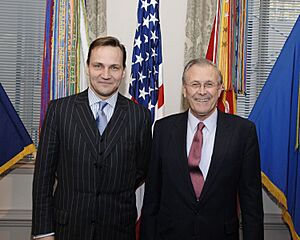
In 2005, Sikorski was elected as a senator from Bydgoszcz. On October 31, 2005, he became the Minister of National Defence. During his time in this role, he moved old military files to a national remembrance institute. He also made public Warsaw Pact maps that showed Soviet plans for war against NATO.
Sikorski resigned from his position on February 5, 2007. In the 2007 parliamentary elections, he was elected to the Lower House of Parliament (Sejm).
Minister of Foreign Affairs (2007–2014)
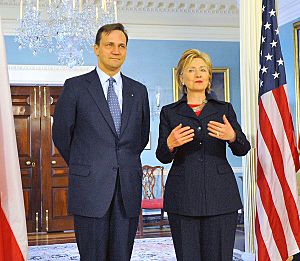
On November 16, 2007, Sikorski became the Minister of Foreign Affairs in Donald Tusk's government. He joined Tusk's Civic Platform party.
As Foreign Minister, Sikorski worked to improve relations with Russia. He also strengthened Poland's ties with Germany and France. Cooperation between Poland, Germany, and France, known as the Weimar Triangle, was very active during his time in office.
In 2008, Sikorski completed talks with the U.S. about placing a missile defense base in Poland. He made sure Poland would have control over the base staff and asked the U.S. to improve Poland's air defenses. The agreement was signed with U.S. Secretary of State Condoleezza Rice.
In March 2010, Sikorski ran in the Civic Platform's presidential primary election. At that time, he was very popular among Polish politicians.
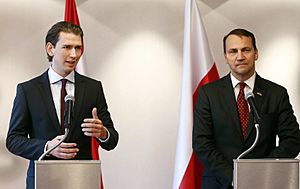
In November 2011, during a financial crisis in Europe, Sikorski gave an important speech in Berlin. He said that European Union countries had to choose between closer economic cooperation or the collapse of the Eurozone. He asked Germany to lead in saving the euro, offering Poland's support. Many people believe this speech changed how Poland was seen in Europe.
Sikorski was also involved in the events of the Euromaidan protests in Ukraine in 2014. He signed an agreement on February 21, 2014, with Ukrainian leaders and foreign ministers from Russia, France, and Germany to promote peaceful changes in Ukraine.
Views on Historical Events
In a 2011 interview, Sikorski stated that the Holocaust was carried out by Nazi Germany on Polish soil, against Poland's will. He emphasized that it was a creation of the German state.
Ukraine Policy
Sikorski strongly supported closer ties between the EU and its Eastern neighbors, especially Ukraine. He was a main architect of the EU's Eastern Partnership policy, along with his Swedish counterpart Carl Bildt. This policy aimed to bring countries like Ukraine closer to Europe.
He also supported opening EU borders to Ukraine and the Russian exclave of Kaliningrad through special agreements. These agreements allowed citizens from neighboring regions to travel to Poland without a visa.
During the Maidan crisis in Ukraine in February 2014, Sikorski played a leading role as a European politician. He called pro-Russian separatists "terrorists." In July 2014, he visited Kyiv and argued that sanctions should be placed on Russia for its actions in Ukraine.
Campaign for EU Foreign Affairs Role
On August 1, 2014, Sikorski was nominated for the position of High Representative of the Union for Foreign Affairs and Security Policy (HRUFASP). He was a strong supporter of sanctions against Russia.
On August 3, Sikorski said that the Malaysia Airlines Flight 17 crash helped unite European leaders against Russia. He called for more NATO troops in Poland and better defense plans. However, on August 30, Polish Prime Minister Donald Tusk was appointed President of the European Council, and another candidate was chosen for the HRUFASP role.
In September 2015, after leaving the Foreign Ministry, Sikorski visited Kyiv again. He argued that if Russia continued to move into Ukraine, Western countries should provide Ukraine with defensive weapons.
Marshal of the Sejm (2014–2015)
On September 24, 2014, Sikorski was elected Marshal of the Sejm (Speaker of the Polish Parliament). As Marshal, he introduced several reforms, including new rules for parliamentary travel and voting.
On June 10, 2015, Sikorski announced he would resign from the post. He explained that he did not want to harm his party's chances in the upcoming election.
Policy Analyst in US (2015–2018)
On November 6, 2015, Sikorski was appointed a Senior Fellow at Harvard University's Center for European Studies. He also became a distinguished statesman at the Center for Strategic and International Studies.
European Parliament (2019–2023)
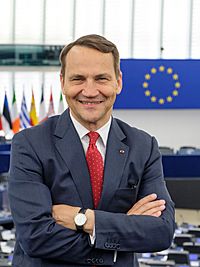
In the 2019 European Parliament election, Sikorski was elected as a MEP. He became the new chair of the European Parliament's Delegation for relations with the United States.
2022 Russian Invasion of Ukraine
On May 15, 2022, Sikorski took part in a debate about the Russian invasion of Ukraine. He identified Vladimir Putin as responsible for the invasion.
On June 13, Sikorski stated that Russia seemed to be breaking the 1994 Budapest Memorandum. In this agreement, Ukraine gave up its nuclear weapons. Sikorski argued that Russia broke the deal by invading Ukraine.
On September 27, 2022, after explosions damaged the Nord Stream 1 and 2 gas pipelines, Sikorski posted a message on Twitter. He later deleted the message and follow-up tweets.
In January 2023, Sikorski suggested that the Polish government had considered dividing Ukraine in the early days of the Russian invasion. The government denied these claims.
Minister of Foreign Affairs (2023–present)
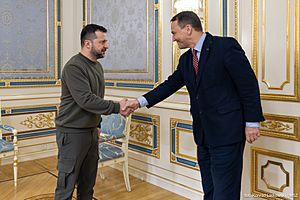
Sikorski was reappointed as Minister of Foreign Affairs in Donald Tusk's government on December 13, 2023.
He made his first visit to Kyiv, Ukraine, where he met with Ukrainian leaders. He urged Western countries to rearm and continue military production as long as the Russian invasion of Ukraine was ongoing.
In January 2024, he expressed strong support for Israel during the Gaza war.
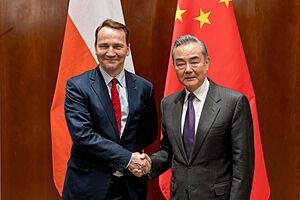
On March 13, 2024, Sikorski announced that 50 ambassadors appointed by the previous government would be recalled.
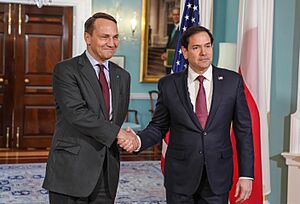
In April 2024, the Polish government offered to help Ukrainian men of military age living in Poland return to Ukraine for military service. Sikorski later said this would be a complex step and Ukraine should lead on the issue.
In July 2024, Sikorski stated that Poland would spend 5% of its GDP on defense by 2025. This would be the highest percentage in NATO.
In November 2024, Sikorski confirmed he would participate in the presidential primary election for the Civic Coalition. He lost to Mayor of Warsaw Rafał Trzaskowski in the primary held on November 22.
In May 2024, Sikorski supported significant increases in European defense spending. He suggested Poland would allocate 4% of its GDP to defense. He also backed initiatives for stronger European military cooperation. This included creating a 5,000-strong EU mechanized brigade. He also supported including the United Kingdom and Ukraine in European defense structures. Sikorski spoke against the earlier reduction of European defense industries. He recommended creating an "investment bank" for the European Union to face the Russian threat.
Other Activities
Sikorski is involved in several other organizations:
- Sir Bani Yas Forum, Member of the advisory board (since 2017)
- Bilderberg Group, Member of the Steering Committee
- Munich Security Conference, Member of the Advisory Council
- Honorary Fellow at the Pembroke College, University of Oxford
Books Published
- Moscow's Afghan War: Soviet Motives and Western Interests, 1987
- Dust of the Saints, 1989
- The Polish House: An Intimate History of Poland, 1998
- Strefa Zdekomunizowana [Decommunized Zone], 2007
- Polska może być lepsza [Poland Could Be Better], 2018
- W okopie, w redakcji, w ministerstwie [In Trenches, in Editorial Offices, in Ministries], 2022
- Polska. Stan Państwa [Poland. The State of the State], 2022
Honors and Awards
Sikorski has received many honors and awards, including:
- Grand Cross of the Order of Merit of the Federal Republic of Germany, Germany, 2016
- Grand Officer of the Legion of Honour, France, 2012
- Commander Grand Cross of the Order of the Polar Star, Sweden, 2011
- Knight of Freedom Award, 2015
- Listed among the "Top 100 Global Thinkers 2012" by Foreign Policy magazine.
- Freedom Award, the Atlantic Council
- Honorary Doctorate, Nova University, Lisbon, 2015
Personal Life
Since 1992, Radosław Sikorski has been married to American journalist and historian Anne Applebaum. They have two sons, Aleksander (born 1997) and Tadeusz (born 2000).
See also
 In Spanish: Radosław Sikorski para niños
In Spanish: Radosław Sikorski para niños
- History of Poland (1989–present)
- List of political parties in Poland
- List of politicians in Poland
- Politics of Poland
 | Isaac Myers |
 | D. Hamilton Jackson |
 | A. Philip Randolph |

